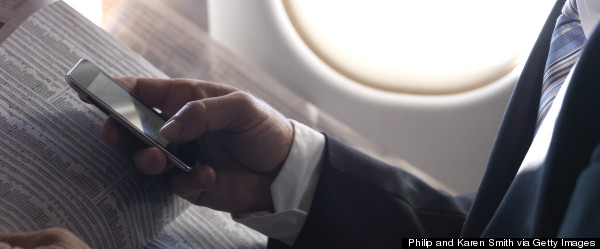 If you’re one of the few air travelers excited about the prospect of making cell phone calls in flight, then you may want to brace yourself: It’s probably going to cost a fortune.
If you’re one of the few air travelers excited about the prospect of making cell phone calls in flight, then you may want to brace yourself: It’s probably going to cost a fortune.
While U.S. cell phone carriers aren’t yet commenting on the possible cost of domestic in-flight wireless service, experts say it’s likely they’ll adhere to pricing schemes similar to those used in global travel. Outside the U.S., where some airplanes have for years been outfitted with technology that allows passengers to make phone calls and to text in flight, customers pay the same fees to their wireless carriers as if they were roaming internationally.
The going rate can be several dollars per minute.
“They can demand any price because they’ve got the definition of a captive audience,” said Chris Silva, a mobile research director at Gartner, the technology research firm. “They’d be foolish not to make it expensive.”
The Federal Communications Commission raised an Internet furor on Thursday when it announced it would consider allowing U.S. passengers to make cell phone calls when planes travel above 10,000 feet. The union representing flight attendants quickly released a statement saying the agency “should not proceed with this proposal.”
AT&T, Verizon, Sprint and T-Mobile declined to comment on the FCC’s plan. But the Consumer Electronics Association, which represents technology companies, and the Telecommunications Industry Association, a trade group, reacted favorably to the news.
On Friday, FCC chairman Tom Wheeler said the decision to allow cell phones on planes will be left up to individual airlines. According to the Wall Street Journal, Delta, Southwest and Virgin America consider in-flight cell phone use “virtually off the table.”
In a statement to The Huffington Post, Jetblue said that if the FCC policy were to change, the company “would prioritize making the cabin comfortable and welcoming for all — for those who want cell service and for those who like peace and quiet.” United said in an email that it will take into account customer and crew feedback “when the FCC makes a proposal available.”
Should the proposal go through, cellular access on airplanes in the U.S. may follow the model in place on overseas carriers, meaning it could be as just as expensive.
“There will be some kind of roaming charge,” said John Walton, the director of data for Routehappy, a site that rates flights based on “happiness scores” like Wi-Fi availability, in-seat power access and seat size. “There would have to be some kind of charge over and above regular phone calls to actually make it worth anyone’s time to incur this capital expense.”
Phone calls from planes equipped with technology from OnAir, a Swiss company that counts British Airways, Emirates and Singapore Airlines among its customers, is about $3 to $4 per minute, said Aurélie Branchereau-Giles, the director of communications for the company. “You would expect similar pricing” in the U.S., she said.
Passengers using OnAir’s service, as well as AeroMobile, another provider, connect to the cellular network like it’s an international network, and are later billed through their wireless carriers.
Many of the people who took to social media to complain about the possibility of having a neighbor barking into a cell phone during a flight would no doubt welcome prohibitively high service costs. As the Journal reports, 51 percent of people have negative feelings about passengers making phone calls on planes, according to a survey cited by the FAA in an advisory group report from earlier this year.
But experts say that in part due to the likely high expense of making a call longer than a few minutes, any fear of having to endure someone else’s flight-long phone call is overblown.
“The sky is not falling,” said Routehappy’s Walton. “This is not going to be a disaster for passengers.”
Walton said the high price of in-flight calls combined with attention to social norms will prevent people from spending entire cross-country flights chatting away on their cell phones. People who talk on their phones loudly on airplanes will be viewed as rude, like those who listen to music without wearing headphones, he said.
“I cannot say that people are going to willingly be that person on the plane who aren’t already that person on the plane for some other reason,” he said.
Plus, people increasingly use their cell phones for purposes other than voice calls, like sharing pictures, using messaging and social networking apps and writing emails.
“People are already feeling that it’s rude to call people” without first texting them, said Tero Kuittinen, a mobile analyst at Alekstra, a firm that works to reduce companies’ phone bills.
As an example of cell phone use on public transit, Kuittinen pointed to the metro system in Helsinki, Finland, most of which is above ground and has cellular service.
“You rarely see anyone talking,” he said, noting that he’s observed people instead messaging and using the photo-sharing app Instagram. “I feel like Americans are too scared of this.”
Article read in huffingtonpost

